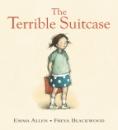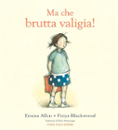AustLit
Latest Issues
AbstractHistoryArchive Description
'Sometimes you don't always get what you want. Instead of the rocket backpack, you might end up with a terrible suitcase for the very first day of school. And this makes you mad! But sometimes what you think is terrible, might not be so terrible after all, especially when there are rocket ships and new friends involved.
'The Terrible Suitcase is a lovely story about acceptance, making friends and new experiences.' (From the publisher's website.)
Notes
-
Launched at Paperchain Bookstore, Manuka, Australian Capital Territory, 21 July 2012.
-
This is affiliated with Dr Laurel Cohn's Picture Book Diet because it contains representations of food and/or food practices.
Food depiction - Incidental
Food types - Everyday foods
- Discretionary foods
- Everyday drinks
- High sugar foods
- Processed foods
- Fresh foods
Food practices - Eating out - snack
- Food preparation
- Food serving
Gender - Food preparation - female
- Food serving - female
Signage n/a Positive/negative value n/a Food as sense of place - Domestic
Setting - Domestic interior
Food as social cohesion - Family meals [dinner]
- Relationships
Food as cultural identity - White Australian characters
Food as character identity n/a Food as language n/a
Publication Details of Only Known VersionEarliest 2 Known Versions of
Works about this Work
-
What Are We Feeding Our Children When We Read Them a Book? Depictions of Mothers and Food in Contemporary Australian Picture Books
2016
single work
criticism
— Appears in: Mothers and Food : Negotiating Foodways from Maternal Perspectives 2016; (p. 232-244)'This chapter explores how Australian writers and illustrators in the twenty-first century depict the act of mothering in picture books for young children in relation to cooking and serving food. It draws on the idea that children’s texts can be understood as sites of cultural production and reproduction, with social conventions and ideologies embedded in their narrative representations. The analysis is based on a survey of 124 books that were shortlisted for, or won, Children’s Book Council of Australia awards between 2001 and 2013. Of the eighty-seven titles that contain food and have human or anthropomorphised characters, twenty-six (30 percent) contain textual or illustrative references to maternal figures involved in food preparation or provision. Examination of this data set reveals that there is a strong correlation between non-Anglo-Australian maternal figures and home-cooked meals, and a clear link between Anglo-Australian mothers and sugar-rich snacks. The relative paucity of depictions of ethnically unmarked mothers offering more nutritious foods is notable given the cultural expectations of mothers as caretakers of their children’s well-being. At the same time, the linking of non-Anglo-Australian mothers with home-cooked meals can be seen as a means of signifying a cultural authenticity, a closeness to the earth that is differentiated from the normalised Australian culture represented in picture books. This suggests an unintended alignment of mothers preparing and serving meals with “otherness,” which creates a distancing effect between meals that may generally be considered nutritious and the normalised self. I contend there are unexamined, and perhaps unexpected, cultural assumptions about ethnicity, motherhood, and food embedded in contemporary Australian picture books. These have the potential to inscribe a system of beliefs about gender, cultural identity, and food that contributes to readers’ understanding of the world and themselves.'
Source: Abstract.
-
Creating a First Picture Book
2013
single work
— Appears in: Lu Rees Archives Notes, Books and Authors , no. 35 2013; (p. 25-27) -
Old Kids on the Block Take Titles
2013
single work
column
— Appears in: The Sydney Morning Herald , 17-18 August 2013; (p. 32) The Age , 17 August 2013; (p. 29) The Canberra Times , 17 August 2013; (p. 20) -
Review : The Terrible Suitcase
2012
single work
review
— Appears in: Buzz Words , August 2012;
— Review of The Terrible Suitcase 2012 single work picture book -
[Review] The Terrible Suitcase
2012
single work
review
— Appears in: Magpies : Talking About Books for Children , September vol. 27 no. 4 2012; (p. 30)
— Review of The Terrible Suitcase 2012 single work picture book
-
[Review] The Terrible Suitcase
2012
single work
review
— Appears in: Bookseller + Publisher Magazine , April/May vol. 91 no. 8 2012; (p. 17)
— Review of The Terrible Suitcase 2012 single work picture book -
Imagine That!
2012
single work
review
— Appears in: The Canberra Times , 25 August 2012; (p. 26)
— Review of The Terrible Suitcase 2012 single work picture book ; Too Many Elephants in This House 2012 single work picture book ; The Little Dinosaur 2012 single work picture book -
Firing the Imagination
2012
single work
review
— Appears in: Australian Book Review , September no. 344 2012; (p. 74-75)
— Review of The Magnificent Tree 2012 single work picture book ; The Pros and Cons of Being a Frog 2012 single work picture book ; It's a Miroocool 2012 single work picture book ; Ten Tiny Things 2012 single work picture book ; The Terrible Suitcase 2012 single work picture book ; The Red Wheelbarrow 2012 single work picture book ; Alex and the Watermelon Boat 2012 single work picture book ; The Coat 2012 single work picture book ; Tanglewood 2012 single work picture book -
[Review] The Terrible Suitcase
2012
single work
review
— Appears in: Magpies : Talking About Books for Children , September vol. 27 no. 4 2012; (p. 30)
— Review of The Terrible Suitcase 2012 single work picture book -
[Review] The Terrible Suitcase
2012
single work
review
— Appears in: Reading Time : The Journal of the Children's Book Council of Australia , August vol. 56 no. 3 2012; (p. 25)
— Review of The Terrible Suitcase 2012 single work picture book -
Old Kids on the Block Take Titles
2013
single work
column
— Appears in: The Sydney Morning Herald , 17-18 August 2013; (p. 32) The Age , 17 August 2013; (p. 29) The Canberra Times , 17 August 2013; (p. 20) -
Creating a First Picture Book
2013
single work
— Appears in: Lu Rees Archives Notes, Books and Authors , no. 35 2013; (p. 25-27) -
What Are We Feeding Our Children When We Read Them a Book? Depictions of Mothers and Food in Contemporary Australian Picture Books
2016
single work
criticism
— Appears in: Mothers and Food : Negotiating Foodways from Maternal Perspectives 2016; (p. 232-244)'This chapter explores how Australian writers and illustrators in the twenty-first century depict the act of mothering in picture books for young children in relation to cooking and serving food. It draws on the idea that children’s texts can be understood as sites of cultural production and reproduction, with social conventions and ideologies embedded in their narrative representations. The analysis is based on a survey of 124 books that were shortlisted for, or won, Children’s Book Council of Australia awards between 2001 and 2013. Of the eighty-seven titles that contain food and have human or anthropomorphised characters, twenty-six (30 percent) contain textual or illustrative references to maternal figures involved in food preparation or provision. Examination of this data set reveals that there is a strong correlation between non-Anglo-Australian maternal figures and home-cooked meals, and a clear link between Anglo-Australian mothers and sugar-rich snacks. The relative paucity of depictions of ethnically unmarked mothers offering more nutritious foods is notable given the cultural expectations of mothers as caretakers of their children’s well-being. At the same time, the linking of non-Anglo-Australian mothers with home-cooked meals can be seen as a means of signifying a cultural authenticity, a closeness to the earth that is differentiated from the normalised Australian culture represented in picture books. This suggests an unintended alignment of mothers preparing and serving meals with “otherness,” which creates a distancing effect between meals that may generally be considered nutritious and the normalised self. I contend there are unexamined, and perhaps unexpected, cultural assumptions about ethnicity, motherhood, and food embedded in contemporary Australian picture books. These have the potential to inscribe a system of beliefs about gender, cultural identity, and food that contributes to readers’ understanding of the world and themselves.'
Source: Abstract.
Awards
- 2013 CBCA Book of the Year Awards — Notable Book — Early Childhood
- 2013 CBCA Book of the Year Awards — Notable Book — Picture Book
- 2013 winner CBCA Book of the Year Awards — Book of the Year: Early Childhood
- 2012 shortlisted Western Australian Premier's Book Awards — Premier's Prize for Writing for Children






